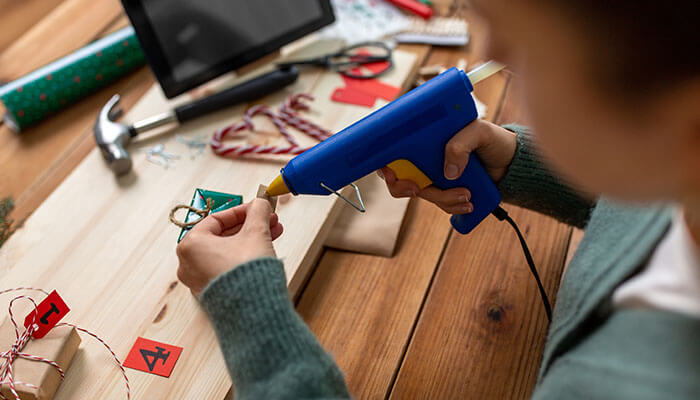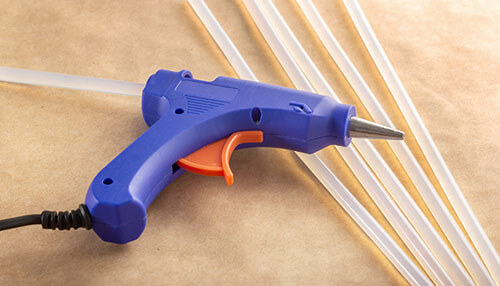Hot melt glues, also known as hot melt adhesives (HMA), are thermoplastic adhesives that can be used for bonding materials. They can be applied for home improvement projects, crafts, and quick repair jobs. They’re used across industries too. For instance, in the packaging industry, they’re applied to close the flaps of paperboard cartons and corrugated boxes.
On the other hand, they’re used for spine glueing in the bookbinding industry and insulating a device’s components in the manufacturing industry.
To properly bond materials with HMA, you need to apply the adhesive in its liquid or molten state to one of the materials and then bring the second material in contact with the material that contains the HMA. Once the adhesive has cooled down, it will bond both materials securely.
If you’re in search of hot melt glue for a personal project, you can visit websites like https://www.hotmelt.com/collections/hot-melt-glue-sticks.
Read on to learn about the advantages and disadvantages of hot-melt glues.
Pros Of Hot Melt Glues
1. They’re Steady
The strong bonding glue of HMA is, in particular, formulated to withstand a wide range of temperatures and humidity levels. This superb feature guarantees that you will never revel in any peeling problems, no matter the environmental conditions. With HMA, your substances will continue to be securely bonded, giving you peace of mind and the understanding that your project will withstand the test of time.
2. They Can Be Used Repeatedly
If, by any hazard, you show up to screw up at some point of bonding, you might not fear approximately it in any respect due to the fact you may genuinely reheat the cloth. This versatile solution, referred to as HMA (Hot Melt Adhesive), can be used no longer just for fixing broken vases but also for diverse restoration jobs across the house, consisting of patching up cracks, securing unfastened tiles, mending torn upholstery, reinforcing loose joints, and even repairing small plumbing leaks. Its effectiveness and simplicity of use make it an invaluable device for any DIY fanatic or expert handyman.
3. They Don’t Contain Any Water
HMA, additionally referred to as hot melt adhesive, is a glue-like substance that is extremely convenient to paint with. One of its biggest advantages is that it does not incorporate any additional fluxes or water, making it tremendously clean to transport and shop. Moreover, its precise composition allows its solids to be transformed into numerous bureaucracies, such as strips, pellets, blocks, and films. This versatility, combined with its lengthy shelf life, makes HMA a quite handy and user-pleasant adhesive choice.
4. They Don’t Produce Toxic Fumes
Furthermore, hot melt glues don’t emit toxic fumes when used, and they have no solvents in their solution. Thus, they’re safe to use since they won’t explode, burn, or contribute to any health complications. They can even be water-resistant, so they’re a useful tool to use in humid conditions.
With all these benefits, it’s no wonder that hot-melt glues have become some of the most popular DIY tools in almost any industry. Whether for construction or creative purposes, their strong, stable bonding effect makes them quite a reliable and convenient product.
Though they’re practical, they come with disadvantages as well:
Cons Of Hot Melt Glues
1. You Have To Prepare Surfaces Before Use
HMA sticks quickly when drying, so you wouldn’t want it to fall on surfaces carelessly. Prepare the surface before use by covering it with bubble wrap or newspapers. You can also prep the surface using your approach to protect exterior parts and furniture.
A helpful tip is to use machinery like glue guns. This will reduce the number of mistakes made during your project.
2. You Have To Work Quickly
Hot softening glues dry quickly, so you ought to work as quickly as you can to make certain the materials get bonded. To expedite the bonding technique, it’s really helpful to utilise a glue gun, which may be easily activated when you’re geared up to make use of it. This will allow you to maximise productivity and efficiency by effectively streamlining the adhesive utility method. By using this approach, you could paint optimistically, understanding that the new softening glue will dry unexpectedly and securely bond the materials together.
Hot-melt Melt Glue Guns
When applying hot melt glues, take advantage of hot melt glue guns since they prevent you from leaving a mess on the surface you’re working on. Hot melt glue guns also help you work at your own pace, whether it’s for a home improvement project or a new jewelry line. If you don’t have the budget to get a hot melt glue gun, you should go for products that come with their application, like a small brush or an industrial tincture.
Materials That Work Well With Hot Melt Glues
Plastic bonds well with hot melted glues and create a durable bond between the materials. Other materials that work well with hot melted glues include ceramic, wood, glass, and fabrics. Moreover, hot melt glues are popular in the fashion industry, as they bond materials effectively.
Materials That Don’t Work Well With Hot Melt Glues
Some materials won’t work well with hot melt glues. For example, materials with smooth surfaces, such as vinyl, metal, or wet and greasy places, are harder to bond. So, when working with hot melt glue, check all your equipment. There should be no cracks in your hot melt glue gun. If there are cracks you fail to notice, your task will only turn out messier than it should be.
As an extra precaution, make sure you wear some protective gear, like goggles or gloves. It’s important to protect your eyes always during any construction or creative project. Remember to follow all the directions that come with your hot melt glue product for the best results.
Conclusion
Hot melt glues are convenient for home improvement or other hands-on projects and are widely used in various industries. But they can destroy your furniture and cause injuries if you don’t take the necessary steps to protect surfaces and wear safety gear.



